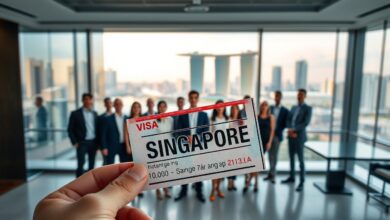Visa Sponsorship Application Process for France: A Detailed Guide
The Visa Sponsorship France Application is key for those wanting to work in France. This guide helps Nigerian professionals understand the French immigration process.
You will be redirected to another website
It covers the steps to get a work permit in France. Knowing the details in this guide can improve your chances of getting sponsorship. It also helps you find good job opportunities in France.

Understanding Visa Sponsorship for France
Visa sponsorship is key in France’s immigration process. It means an employer in France offers to sponsor a foreign worker for a visa. This allows the worker to legally live and work in the country. Knowing this can lead to many job opportunities in France, especially for skilled workers looking to grow their careers.
What is Visa Sponsorship?
In France, visa sponsorship means the employer takes on legal duties for a foreign worker’s visa. They must show they tried to hire a local first. This shows they value both local jobs and the skills of international workers.
Importance of Visa Sponsorship for Foreign Workers
Job sponsorship in France is very important for foreign workers. It opens the door to good jobs and helps them fit into French society. Sponsored workers get legal permission to work, making them more eligible for jobs. This process also brings in new skills, promotes cultural exchange, and boosts the economy.
Eligibility Criteria for Visa Sponsorship
Understanding visa sponsorship eligibility is key for those looking for jobs in France. Meeting France’s visa requirements is the first step. Candidates need to have the right elements to apply. This section covers general and specific criteria for different jobs.
General Requirements
To get a visa sponsorship in France, you must meet several basic criteria. The main requirements include:
- A valid passport with a minimum validity period.
- Proof of qualifications relevant to the job offer.
- A formal job offer from a French employer.
- Compliance with health and character assessments, if required.
These criteria check if workers can legally and effectively contribute to France’s workforce.
Specific Criteria for Different Job Categories
France’s sectors have specific criteria based on the job type. For example:
- IT sector: Technical skills and certifications are often critical.
- Engineering positions: A strong educational background in engineering and relevant experience is preferred.
- Healthcare professionals: Must demonstrate qualifications recognized in France and proficiency in the French language.
Knowing these specific requirements is crucial. Matching your qualifications and experience with the job can boost your visa sponsorship chances.
Types of Visa Sponsorship Available
Foreign workers looking to work in France have several visa options. Each visa type has its own purpose and is for different types of workers. Knowing these options helps in making the right choice for a visa application in France.
Long-Stay Work Visa
The Long-Stay Work Visa is for skilled professionals wanting to work in France. It lets people live and work there for a long time. To get this visa, you need to have a job offer and the right documents.
Talent Passport
The Talent Passport is for highly skilled workers and those in demand in France. It focuses on qualifications and the need for talent in certain sectors. You must show your qualifications and a job offer that meets the visa’s criteria.
Intra-Company Transfer Visa
The Intra-Company Transfer Visa is for employees moving to France from other countries. It helps companies grow and allows workers to keep contributing in a new place. You’ll need to show your job role, qualifications, and work history.
The Application Process Overview
Applying for a visa in France might seem hard, but knowing the basics makes it easier. This part explains the main steps to get a visa. It also talks about important documents you need for success. The French immigration process has several stages, from getting a job offer to submitting your paperwork.
Step-by-Step Guide to the Application Process
The first step is getting a job offer from a French employer. Then, you need to prepare your application carefully. Here’s a quick guide to the steps:
- Get a valid job offer from a French employer.
- Collect all the documents needed by immigration authorities.
- Fill out the visa application form correctly.
- Send your application and documents to the French consulate or embassy.
- Go to any interviews or confirmations as scheduled.
Key Documents Required
To increase your chances of finding a job in France, you need to bring certain documents. These include:
- Proof of employment, like a signed job contract.
- Identification, such as a valid passport.
- Educational records and transcripts.
- Language skills certificates, if needed.
Having these documents ready ahead of time helps. It makes the visa application process smoother. Knowing what you need helps you prepare well, making your move to France easier.
How to Find a Sponsor in France
Finding a sponsor in France is key for job sponsorship. Good job search strategies help find employment opportunities. Using different resources helps navigate the French job market.
Recommended Job Search Strategies
- Online Job Boards: Websites for job listings are great for international applicants.
- Recruitment Agencies: Working with agencies can help find employers who offer job sponsorship.
- Company Websites: Many companies post jobs on their own sites, especially for international hires.
Networking Opportunities and Resources
Building a professional network is crucial. It gives insights and connections in the French job market. Attending industry events and joining groups can lead to job sponsorship.
Online platforms like LinkedIn have groups for different sectors. They help connect with experienced professionals.
Preparing Your Application
Getting a visa to work in France is key to finding a job. You need to focus on the details and know what makes your application stand out. It’s important to avoid common mistakes that can hurt your chances.
Tips for Crafting a Strong Application
First impressions are everything in a visa application. Here are some tips to make your application better:
- Tailor your CV: Make your CV fit French standards. It should show your relevant experiences and skills.
- Highlight applicable skills: Show the skills that employers want in skilled workers.
- Provide a clear cover letter: A good cover letter can make you stand out. It should explain why you’re a good fit for the job.
- Gather all required documentation: Make sure you have all the documents needed. They should show your qualifications and experience.
Common Mistakes to Avoid
Knowing common mistakes can help you avoid problems. Here are some mistakes to watch out for:
- Submitting incomplete documentation: Missing documents can cause delays or denial.
- Neglecting to follow guidelines: Each application has its own rules.
- Overlooking deadlines: Being on time is crucial in job searches.
- Failing to proofread: Small mistakes in spelling and grammar can make a bad impression.
After the Application: What to Expect
After submitting the visa application, applicants face a key part of the French immigration journey. Knowing what happens next can help ease worries. It’s important to understand the typical waiting times in France. This knowledge helps plan for the future and look out for job opportunities in France.
Processing Times and Follow-Up
Waiting times vary based on the visa type and personal situation. Usually, it takes a few weeks to several months. Checking official government sites for the latest information is a good idea. Being patient is key during this time.
Applicants might need to provide more documents. Keeping in touch with the consulate or embassy can also help. This can clarify the application’s status.
Visa Interview Tips
Getting ready for a visa interview is vital. Questions often cover your background, why you’re visiting France, and if you can support yourself. It’s important to speak clearly and have all documents ready.
Practicing answers to possible questions can boost confidence. Being well-prepared can greatly improve your chances of success in the French immigration process.
Living and Working in France
If you’re moving to France with an expat visa, knowing the workplace culture is key. France’s rich history and unique work style can be quite different from other places. Understanding these cultural differences can help a foreign worker succeed and feel happy in their new home.
Cultural Considerations for Foreign Workers
There are several cultural aspects to keep in mind in the French workplace:
- Formality in Address: Always use formal titles like “Monsieur” or “Madame” unless told to use first names.
- Hierarchy: French companies value a clear structure, with respect for those in charge.
- Communication Style: Being direct is important. Employees should share their thoughts openly but tactfully.
- Work-Life Balance: The French believe in keeping personal time sacred and respected.
Benefits of Working in France
Working in France comes with many perks that make life better:
- Competitive Salaries: Many jobs offer good pay that matches the cost of living.
- Quality of Life: France has great healthcare, education, and leisure activities, making life here top-notch.
- Access to Social Services: Workers get social security, helping with health care and job loss.
- Cultural Richness: Living in France means diving into a rich and diverse culture, enriching your life.
Conclusion: Next Steps for Applicants
Starting the visa application process for France is a big step. It’s important to know what comes next. The French immigration process can be complex. Keeping up with policy changes is key to a successful application.
Applicants should check official government resources often. This way, they’ll know the latest requirements and guidelines.
Importance of Staying Informed
Staying current with visa rules is crucial. Outdated knowledge can lead to delays. Being informed helps with the application and prepares for life with a visa.
Resources for Further Assistance
Many resources can help with visa support. Official French immigration websites have the latest on procedures and forms. Legal aid organizations offer help with legal issues.
Support groups for expats share valuable experiences. They can guide you through the process.


